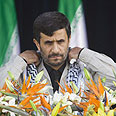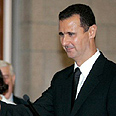

Head of the Military Intelligence Research Division, Brigadier-General Yossi Baidatz, warned Sunday that Iran is well underway to building a nuclear bomb.
In his brief to the cabinet, Baidatz said that the international community is not putting enough pressure on Iran to halt its nuclear enrichment program.
"Iran is focusing its efforts in enriching uranium and improving the operational capabilities of its centrifuges. It is mastering the necessary technology and now has one-third of what it need to create a bomb.
"In view of the UN Security Council's inability to enforce a fourth round of sanctions, Iran's confidence is increasing and they now believe there is nothing the international community can do to stop them. Time is on Iran's side," he warned.
Tehran, continued Baidatz, is tightening its relations with Hizbullah, Syria and various Palestinian terror groups – all in an attempt to position itself as the lead radical force in the Middle East.
"The more moderate Arab states are not united in the wish to act against Iran," he added.
The ties that bind
Baidatz then went on to address the situation on the northern front: "Syria is operating on two contradicting avenues – getting closer to the West on the one hand and giving way to new radicalism on the other," he said.
"The recent Damascus summit, attend by French President Nicolas Sarkozy and Qatari royalty, helped Syria position itself as a key player in regional processes, without paying any price thus far. Syria is willing to go forwards as far as the talks with Israel are concerned, but they are cautious – they're worried that the Turkish avenue will close in light of the recent political developments in Israel."
Syria, he added, "is funneling a great deal of weapons and ammunition to Lebanon, tightening its relations with Iran and fortifying its aerial and ground defenses, with Russia and Iran's assistance. Damascus is trying to play off the recent events in Georgia to get its hands on advanced weapons systems."
As for Hizbullah, Baidatz told the ministers the organization "is not gearing up for a conflict, but it will continue trying to target Israeli aircrafts and using the calm on the northern border to rearm."
On matters relating to the southern front, the head of MI Research said that the relative clam achieved by the ceasefire in the Gaza Strip was holding, despite the fact that the smaller militant groups were trying to target Israelis, mostly in the Sinai Peninsula.
Baidatz concluded his brief by giving the ministers and update on the negotiations held to free kidnapped IDF soldier Gilad Shalit: "Hamas' is apparently aiming to toughen its stands on the release – a stand rooted in their belief that Shalit in a commodity increasing in value.
"Hamas is in no hurry to see this deal materialize," he added, "which is why it has yet to re-launch the talks with Egyptian officials."















